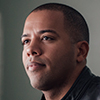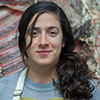



Block, 43, is an internationally touring composer and sound artist with a catalog of more than a dozen albums, including 2013’s harrowing orchestral work Karren (Sedimental)—which the New York Times calls “as rigorously assembled, finely detailed and dramatically taut as any modern composition you might care to name.” A fixture at the Experimental Sound Studio in Ravenswood, Block gravitates toward found sound and manipulating the guts of acoustically dynamic instruments like the piano.
Interview by Kevin Warwick
Photos by Ryan Lowry

I didn’t go to college straight out of high school. I moved and was touring in avant-rock bands, which sounds really pretentious. I decided to go back to school and got my degree in anthropology at Northwestern. I studied at Roosevelt’s music conservatory, but the schedule was rigorous and I toured too much. I was singing and playing guitar in bands, and then I got a four-track—it’s kind of the typical story—and learned how to record, at first for an actual band. Then I began experimenting with the four-track and guitar and was like, “I don’t want to sing anymore. I don’t have ideas for lyrics. I don’t like being onstage.”
I was David Bowie but I wanted to be Brian Eno. I wanted to be lurking in the corner, because the spotlight made me uncomfortable.
I have been thinking a lot about how to approach performance—and I don’t feel that uncomfortable anymore. I have control and I’m doing utilitarian things that require a different kind of concentration than when I was in a band. I naturally move slowly onstage. It started because I get nervous and think to myself, “I don’t want to drop anything, so I’ll just move really slowly.” And I thought I’d develop it. I’m working on this chaotic piece now that involves building up layers, so I’m working against that by moving in this slow way.

I went to Roosevelt because I was obsessed with making orchestral music. I wanted access to instruments, but there were so many structures to move around and languages to learn and communicate. Here’s an orchestra, with all these strings and all these winds, and I’m so interested in layering and timbre. It was the ultimate for me. But you have to go through the conductor; you can’t talk directly to the musicians.

I once met this poet who knew about all of these plants. I was into gardening at the time, so I was curious. He told me, “Well, I’m a poet and that’s my job. I have to know about plants because there are so many poems about flowers.” I feel like that about scoring. If I’m really a composer, I should know the skills even if I don’t use them. I was tired of being this autodidact who didn’t know how to score.
It was overwhelming when I first started studying. I hate scoring. It’s different from working in the studio or with an instrument. It takes a different part of my brain.
I have written orchestral scores now, and I have an idea of how an orchestra functions and how scores should change. I would love to take part in that change, though it would be hard because orchestras are expensive to operate. They function like factories because they’re focused on production. They have to be efficient and they have to focus on the product. There’s no room for improvisation. My wish is that an orchestra would be more like a laboratory in which a composer could come in, try things out, come back, and try something else.

I went to the School of the Art Institute for a time when I first got to Chicago and studied sound. I fell into the right circle. I met Lou Mallozzi, who runs the Experimental Sound Studio. I lend them studio gear and rehearse there. It’s difficult to get access to a grand piano that I can explore. It’s a good deal. [Experimental Sound Studio] is so valuable because there’s an area of extended technique that scoring can’t cover. You have to get in and try stuff, and until you do you don’t know the capabilities.
There’s a lot you can do on the insides of the piano in terms of the range of the instrument and the timbral possibilities. Really low sounds, really big sounds, really quiet sounds. And it has all these different materials that resonate—metal, wood, et cetera. I think about sound a lot. It’s a really beautiful way to hear the world, to perceive the world. I carry a recorder with me everywhere. Sometimes I hear something and it will be a sketch that I can return to with better mikes.

For the past four or five years I’ve been working with film and video. I like playing with the parameters of sitting in a dark theater, listening to surround sound. I was working with two expanded-cinema artists, and I composed this piece which plays with liminal space, between where you can hear and can’t hear a sound. I would use a hiss that would start slowly and quietly and creep into the space until it was booming. It’s like the walls would activate and close in. And light was doing the same thing. It was dim and coming up very slowly. There was an excruciating process of perception, a crescendo of sound and light. Dynamics—quietness, loudness, and the difference between those two—are huge, and they don’t get enough attention. Harmony, rhythm, meter get a lot. Sounds at soft volumes will sound different at louder volumes.
I’m not the kind of artist that goes straight from impulse to product. I’m too emotional, and the product comes out overwrought. The process of distilling makes the work better for others. I’m not in the same headspace as the sound of the work. I overcompensate by working the piece until I know it’s refined enough to be finished.

I’m in more spaces that provide a piano, because it’s more fun for the audience to watch. It’s very dramatic. I do stuff on the low strings and the inside of the piano. Little textures. I’m using fake grass because I like the thickness of it and the way it moves. And I really like the sound of wind on grass. I use clip-on contact mikes and tiny speakers that I got from Radio Shack, and I put the mikes on the metal and through an EQ filter pedal, so that I can control the tone. I’ll just put some broken glass on the strings. I’m interested in activating the sounds of materials.
The [sound-art] subgenre is totally male dominated. In some ways I find it off-putting, in some ways I don’t. I think that at this point it only hinders me in my own mind. Sometimes I feel like I am speaking a language that’s not my native tongue. I kind of think in the way a child would think coming into a space or gallery. Would a kid be superbored in here? Not to say that I want to pander. For an ESS series I made work in the Lincoln Park [Conservatory] Fern Room. I did a piece in which I created this electronic sound work that sounded like the space, but just ever so slightly more electronic than the natural sound. You’d notice this waterfall sound but then figure out it wasn’t that. It made you question the space.

I’m working with [cellist and composer and 2013 People Issue subject] Tomeka Reid. We’re doing some soundtracks for silent films. She’s so thorough in terms of research. One of the films we watched was a slow-motion demolition film. And she was like, “What is this site? It’s a mine. What are they mining? Oh, it’s taconite. Let’s look it up. Let’s get some taconite. Where do you get it? Let’s use taconite in the piece.” And I think that’s awesome, because I was just going to make some sounds. Tomeka’s mind goes towards the concrete history of the film. I want to think more like that. My research would have been focused on expressionistic and poetic qualities.
I’m working on a solo piece called Dissolution. It’s all recorded voices, which I’ve never done before. Voice on tape. Using a cassette brings something to that material, like a cool hissing sound or some click. And I’m into whispers. It’s another liminal sound in that it’s between the realm of hearing and not hearing, but it’s also between the realm of noise and language. Right on the edge of meaning and nonmeaning. Whispers right up against your ears. I’m working with those and trying not to make them tacky.






















